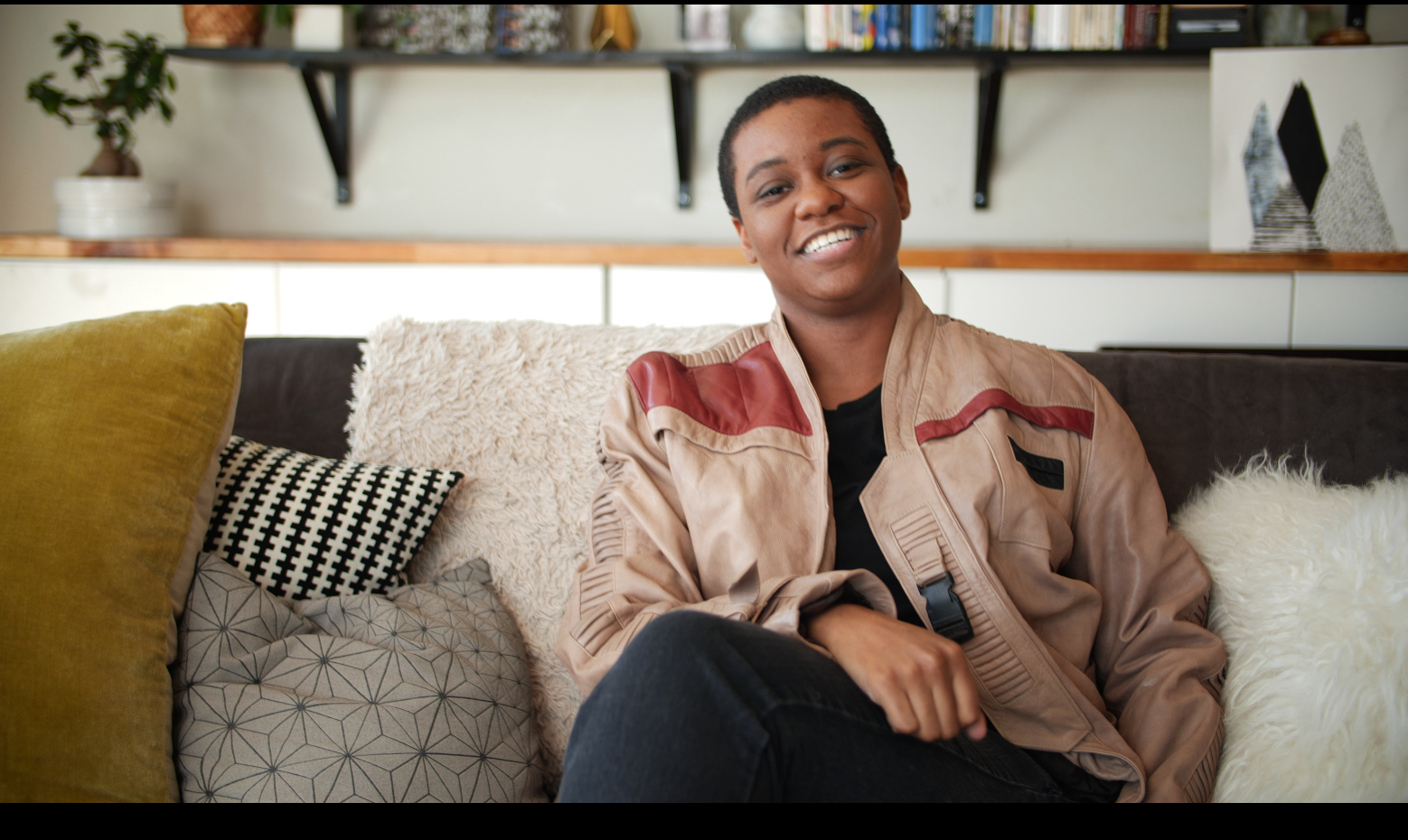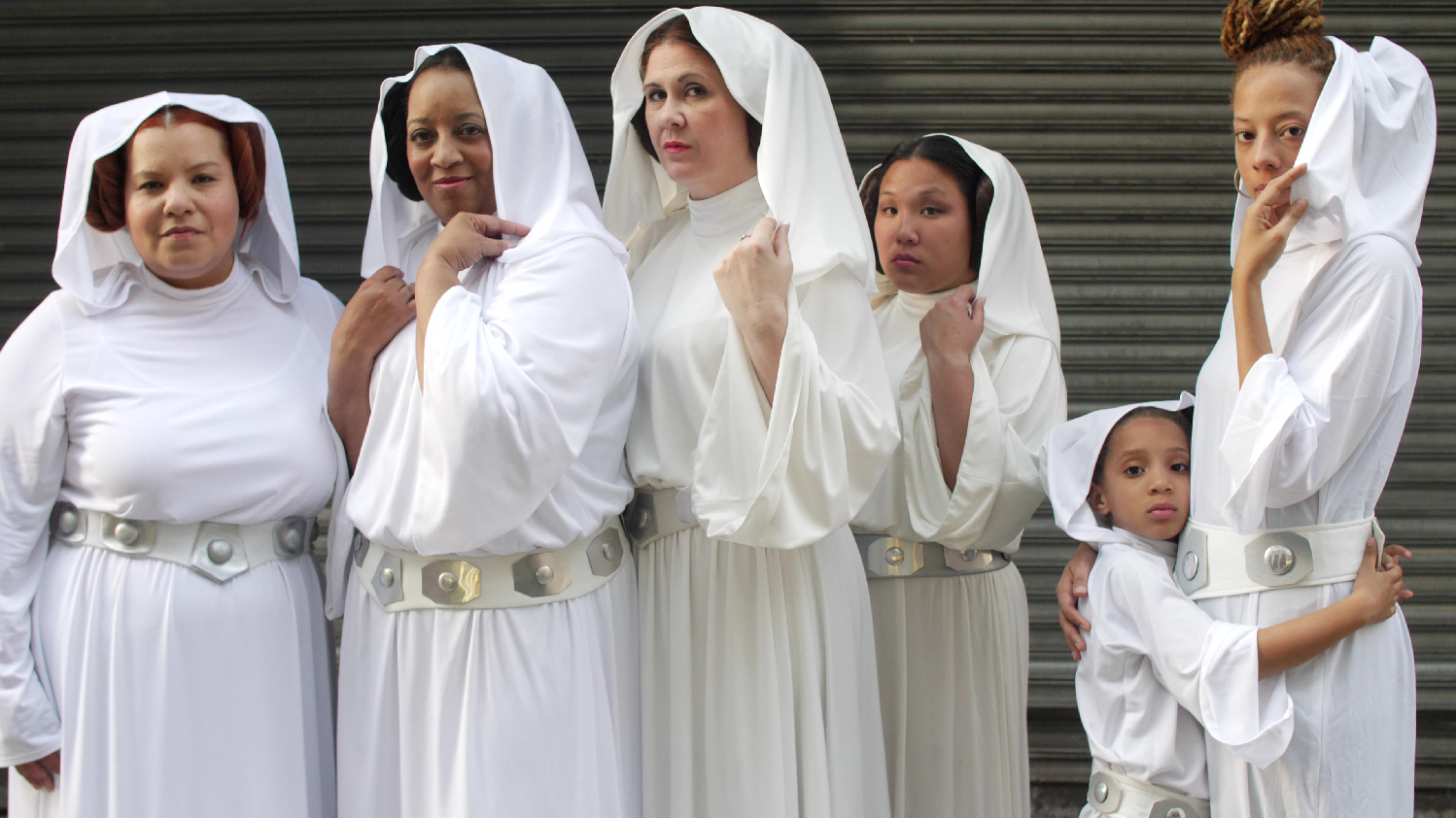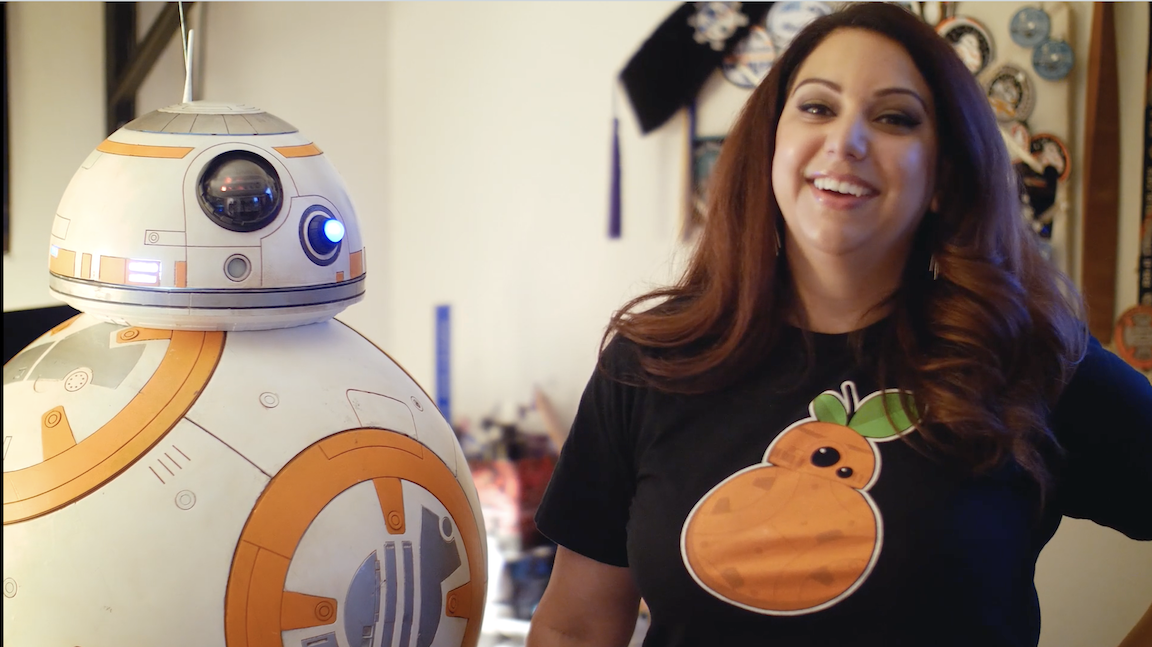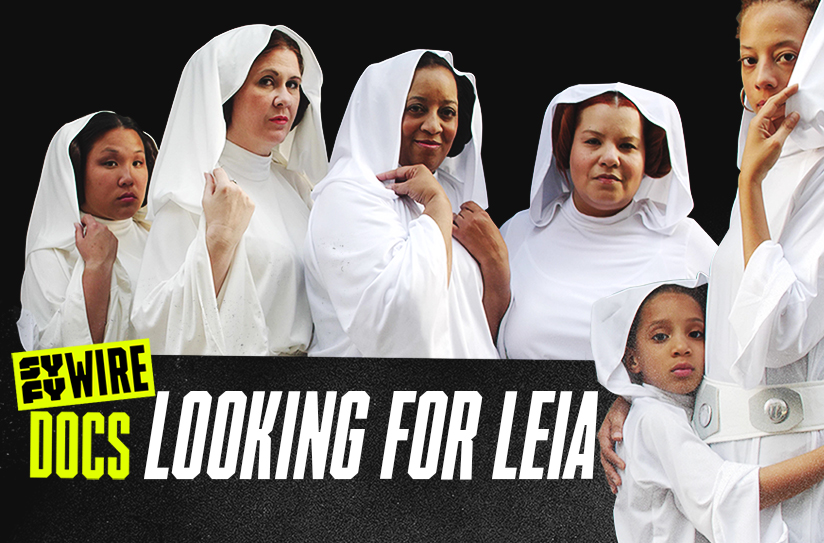Interview With Looking For Leia Director Annalise Ophelian

From the very first conversation with SYFY there was a shared language, about what it means to respect fandom and see it as a valid subject of inquiry.
-Annalise Ophelian
LOOKING FOR LEIA is a seven-part docu-series about women as well as non-binary fans who found identity, connection, and purpose in their love of the galaxy far, far away.
This project is the brainchild of documentary filmmaker Annalise Ophelian, herself a huge Star Wars fan and purveyor of all thingís geek.
This series, which started out as a single film, has taken Annalise years to make as she travelled around the county shooting endless hours of footage/interviews. If youíve attended any of the larger conventions the last couple of years, you likely spotted her and her dedicated crew working diligently.
At some point, when she realized how big this was getting, the decision was made to turn it into a series, and then began the hunt for a home. Eventually, she would entrust her creation to the folks at SYFY Wire, and the rest is now history, having debuted yesterday.
"Looking for Leia" is a sometimes funny, sometimes enlightening, sometimes cathartic, always entertaining look at a part of Star Wars fandom that hasnít historically, and in many ways still doesnít, gotten a fair shake. What itís not however, is preachy or sanctimonious.
She easily avoids those pitfalls with the help of her subjects whose candor is sincere, contemplative, and thoughtful. Annalise speaks with many women and non-binary fans who share their incredible, very personal, stories about growing up in and being a part of Star Wars fandom. Youíd have to be a sociopath to not feel at least a little something when listening to these stories.
The seven episodes are all in the 10 to 15-minute range and fly by, using a type of performative style that is incredibly pleasing and soothing. Shout out to Editor Zach Prewitt for a slick pace and feel, and the score by Christy Carew is emotional and hypnotic, itís good stuff.
This format creates a good sense of familiarity as you work your way through the series, but itís not the same episode on repeat either. No, the subjects of each episode keep things feeling fresh and anew, and with the short runtimes, youíll be left wanting more.
No point in ranking them, theyíre all good and I suspect youíll find something in each one to relate to. What I found pleasing was the historical context Annalise (through her subjects) provides, reminding us that this isnít a new phenomenon, itís just that most of us have just been slow on the uptake.
I spoke with Annalise on the eve of the release of this deeply important and personal project, hereís some of what she had to say!
Enjoy!
Congratulations on the SYFY Wire deal! Tell us a bit about how that came to be, how ďLooking for LeiaĒ landed at SYFY?
Let me start by saying that Iím thrilled ďLooking for LeiaĒ found a home at SYFY. Thereís an incredible alignment between our two missions, with this project and with SYFY as a platform.
Speaking as an audience member and creator, a lot of the things that I both want to watch and want to make, are part of the same sensibilities Iím very much seeing at SYFY Wire. If you canít tell, Iím over the moon that SYFY ended up being our home.
From the very first conversation with SYFY there was a shared language, about what it means to respect fandom and see it as a valid subject of inquiry.
They have a real appreciation and respect for fans in all our fun, creativity, and glory. But also, and more importantly, in all the ways fandom serves as a vital part of our lives.
Often, when youíre pitching the project, youíre having to explain it to other suitors, you can hear the way itís being misinterpreted from folks on the other end. From the earliest conversations with SYFY, I was left with such a wonderful felling of being heard, and that the project really made sense to them.
This project is so personal to you that it almost goes without saying, but, how important was it that you found the right home for ďLooking for LeiaĒ?
As a creator you always want to feel like your partnering in distribution or acquisition with people who have a shared mission, who are in line with you.
Just as a working filmmaker, itís just so thrilling to have your worked picked up at all, especially in the documentary scene where thereís so much content right now.
So, anytime you can find a home for your project with a platform that has a broad audience, that has built a trust with them, and they want to acquire and distribute your work? Thatís a great feeling.
It works on two levels; you of course want to connect your project with the best possible people. And again, speaking as a creator, I feel incredibly fortunate and lucky when someone chooses MY work, amongst a sea of incredible and worthy projects out there.
But yeah, you dream about that perfect home, so I was only talking with places that made sense to the project. I feel honored to have been chosen by SYFY.
With so much discourse right now, the timing of this releases seems to be the will of the Force. You couldnít have known how people would react to TROS, but was it planned to coincide the release of Looking for Leia with Episode IX?
I had conceived of the project before The Force Awakens came out, during Celebration Anaheim in 2015. That was the first time I had the experience of connecting with other women in fandom in a tangible way. It really left me curious and wanting to learn more about that part of Star Wars fandom.
In 2016 after I finished the project I was currently working on, I began to really give it some thought, and then began filming in 2017. Any point along there, as Star Wars movies were coming out, would have made for a timely release.
As far as releasing it now, we started having conversations with SYFY this past summer about what it would be like to marry the two. And it feels synergetic and nice obviously to release it now, as weíre wrapping up the Skywalker Saga.
The culture of fandom changed so much during this time, so the conversations changed along with it. One of the things that is unique about ďLooking for LeiaĒ is that weíre examining fandom from a perspective that isnít commonly found in media.
And in a culture where you need to get clicks, have catchy headlines, and you need people to engage, youíre going to get conflict. But that doesnít represent the kind of complexity and breath of peopleís fandom experiences. People come to fandom inherently because they love it.
That doesnít mean they canít be trenchant about it, that they canít simultaneously hold both love and displeasure, thatís a critical component of consuming media.
But fandom is a generative, creative, interpersonal, and intrapersonal act, and ďLooking for LeiaĒ isnít about character analysis or story critique, thereís lots of that.
What we really wanted to focus on, was transformative works, we wanted to focus on participatory fandom. All the ways that people take these stories they love and bring them into their lives. The ways they interact with them and have grown and changed them in a way that transforms the source material into something new. Thatís the beauty of fandom.
Thatís the thing that fandom gives us that is really unifying, and celebratory, and completely subjective. Whether its someoneís relationship with a droid they 3D-printed, or a costume they made with a family member.
Itís this beautiful little glimpse into someoneís personal experience of loving that ďthingĒ, and thatís a conversation we donít have enough, particularly in this day and age.
Knowing that there will always be a lot of discourse whenever new Star Wars content comes out, itís nice to be able to put this media out into the world. To be a part of that discourse in a way that fully maintains our capacity for critical thinking and analysis, but is at its heart, joyous and celebratory. And those are the kind of stories I donít get to see as often, and thatís the kind of story Iím trying to tell with Looking for Leia. 
What level of responsibility do you feel when making something like Looking for Leia? Do you feel a certain sense of stewardship over this segment of the fandom?
Fandom is not a singular phenomenon, itís a shared human experience thatís as broad as humanity itself. Fandoms exist in ways that are global now, so I trust fandom to makes its own decisions, love what it loves, and not love what it doesnít love.
I donít feel the need to create something that is universally appealing, thereís no way to appeal to such a broad base. I am interested in speaking to groups of fans that have been historically marginalized or under-represented.
Mostly, I feel an incredibly strong sense of responsibility to the folks who I work with on screen and thatís just a part of my methods. Itís important to me that I work very collaboratively with the fans that I film. People are giving me hours and hours of their time, sharing their very personal stories, and Iím distilling them into smaller bits.
So, itís vitally important those stories are authentically and responsibly told on screen, I take that part very seriously.
Itís easy to lose perspective when youíve been so entrenched in a project like this. When it was finally complete, was there anything that surprised you? Something you had perhaps missed the first time.
I was consistently surprised along the way in both personal and other ways.
In personal ways, it was hearing things that people were doing with their fandom that I had no idea about. Iím always happy when as an adult we can be surprised by anything like that, what people create and how they create it is an endless source of wonder to me.
Another surprise was when we were learning about the ďfake fangirls testĒ and the ways that women often have a shared experience in fandom of being interrogated. Being grilled and subjected to a kind of proving ground, having their level of fandom questioned.
And at no time, after talking to over 100 women and non-binary folks on/off camera, did anyone ask me to prove my worth, or provide credentials. There was such generosity and openness when we would discuss our shared experiences in fandom, without having to compare or compete. That felt truly special and unique to me, to not be judged by a metric, or live up to someone elseís standards.
Okay, lots of folks are going to watch this series, whatís the biggest thing youíd like for people to take with them?
Thereís a way in which our fandom represents a very personal part of ourselves. Fandoms are inherently there to serve a purpose; we love a story because it gives us something that we need. It helps us dream, it helps us heal, it gives us a transitional object to help deal with grief and loss.
Thereís also a way in which celebrating fandom at the same time celebrates the resilient parts of us, the parts that connect with story. Particularly in moments when we can get caught up in discourse, I hope folks can look at ďLooking for LeiaĒ and see perspectives they donít often see.
And thereís this idea of leaning in and listening, that thereís something incredible happening when you ask someone why they love this thing that they love so much. Leaning in, and really listen to what they have to say. Iíd love it if folks watching this series got to experience a bit more of that.
"Looking for Leia" is available now on SYFY Wire!
For more information on the show and its creators, go to LookingForLeia.com!
For more information on SYFY, show times, and available platforms, go to SYFY.com
About the Director
Annalise Ophelian (producer/director) is an award-winning documentary filmmaker, psychotherapist, and media consultant whose work includes Diagnosing Difference (2009) and MAJOR! (2015). A lifelong Star Wars fan, her work focuses on centering marginalized voices and highlighting stories of gender and racial justice. Sheís queer identified and lives in San Francisco with her partner of 13 years and their three Chihuahuas. She doesnít often cosplay, but when she does, itís as Han Solo
Related Stories:
The ForceCast Author Series With Special Guest Samuel C. Spitale
Looking For Leia Coming To SYFY This Saturday
Is Lucasfilm Looking To Add More Star Wars Live Action Series To Their Service?
We Talk To "Looking For Leia" Director Annalise Ophelian
* Smack My Switch Up, Too: The Nintendo Switch Discussion Thread
* Free Association Thread.
* Last Word First



